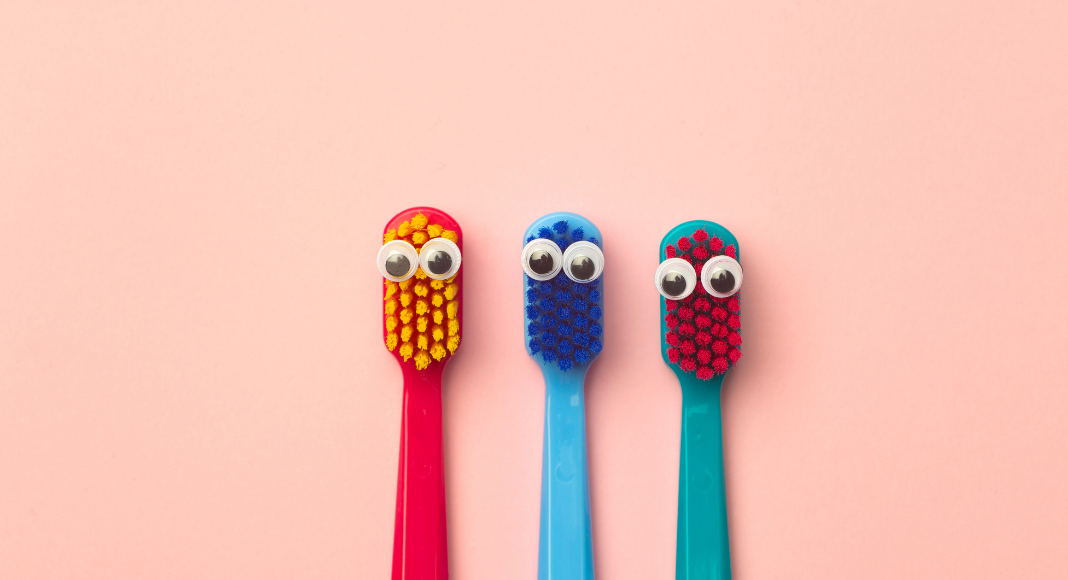 It’s National Children’s Dental Health Month! If you want your child(ren) to join the cavity-free club and enjoy their dental experience(s) in the future, it is imperative to schedule their first visit early on in childhood. The American Academy of Pediatric Dentistry (AAPD) recommends children have their first dental visit by age one or when the child’s first tooth erupts, whichever comes first. Let me assure you though if you just read that statement and thought, “I’m already behind,” please don’t stress. You are doing the best you can for your child with the information/time/energy that you have, and it’s never too late to set your little one up for success. Here are some tips for taking your child to their first dental visit!
It’s National Children’s Dental Health Month! If you want your child(ren) to join the cavity-free club and enjoy their dental experience(s) in the future, it is imperative to schedule their first visit early on in childhood. The American Academy of Pediatric Dentistry (AAPD) recommends children have their first dental visit by age one or when the child’s first tooth erupts, whichever comes first. Let me assure you though if you just read that statement and thought, “I’m already behind,” please don’t stress. You are doing the best you can for your child with the information/time/energy that you have, and it’s never too late to set your little one up for success. Here are some tips for taking your child to their first dental visit!
Taking your child to any event at a scheduled time can be stressful in itself. So, if scheduling your child’s first dental visit sounds like a daunting, impossible, avoid-at-all-costs task, you are not alone. As a registered dental hygienist in a pediatric dental office, please hear me when I say, “We get it.” Flexibility, tantrums, tears, and sometimes vomit come with the territory, so if your own “what ifs,” fears, or insecurities are preventing you from scheduling your baby’s first appointment, you can do it! Take solace in knowing that the likelihood of your child throwing something our way that we have never seen before is extremely rare. Many dental offices offer quick, simple ways to schedule including online appointment requests, scheduling via email, or a quick phone call. In order to expedite the process for everyone, it helps to have your insurance information handy when scheduling. Many offices will verify your child’s eligibility prior to their appointment.
It is also important to find a pediatric dentist specifically for your child(ren). While many dentists in general practices are comfortable with and capable of seeing kids, pediatric dentists specialize in children’s oral health and have attended additional years of schooling after their dental school education. Also, many pediatric dentists complete a residency program (sometimes multiple). Finding a pediatric dentist with whom your insurance is in network is very important, but personal referrals are also a great way to find an excellent provider. Check out local Moms Facebook Groups or ask your friends/relatives for a recommendation! Be sure to check the office’s Google reviews, too!
Filling out new patient paperwork ahead of time will make everything exponentially easier when you arrive. Have you ever tried to sign a document, complete a form, or add something to your calendar with your little one pulling on your leg or taking the clipboard/pen and running away from you? Yep, me too. If your child’s dental office has the option of either completing forms electronically or printing/filling them out at home and bringing them into the office with you, this will save you some unnecessary stress in the office. When completing your child’s paperwork, pay special attention to detail when reporting their medical history. While something may not seem important to your little one’s oral health, many medications/supplements can cause different oral manifestations and certain health conditions (asthma, tonsillitis, cardiac issues, etc.) can alter the way we treat your child for their safety. Particularly if your child has a past or current heart health concern, they may need to take an antibiotic premedication prior to a dental prophylaxis/cleaning. Be as thorough as you can while completing your child’s medical history so that your dental team can provide the best, safest care for your little one!
If at all possible, schedule your baby/toddler for an appointment early in the day, preferably before their nap (but not too close to nap time when they’ll be overly tired). I get it, it is difficult to take off work even for an hour or two, but if you try to schedule your 18 month-old after work/daycare at 4:30 pm, you’re setting yourself up to possibly have a more difficult visit. When kids are already over-stimulated, exhausted, and hungry and then you take them out of their normal routine (Isn’t it funny that toddlers crave routines while also throwing kinks..*cough* tantrums.. into our own routines sometimes?), the likelihood increases that the appointment will start off on the wrong foot.
Speaking of starting off on the wrong foot, it is best not to mention your own dental anxieties or horror stories to your little one. Many parents use scare tactics like “if you don’t listen, the dentist will hold you down and pull your tooth,” or “if you don’t brush your teeth, then they’ll use the drill,” or my personal least favorite “they’re going to give you a shot!” Even if you say these common phrases with a sense of humor, you could be planting a seed of fear/doubt in your child’s mind that will give them reason to hesitate. Your dental team should walk you and your child through the visit step by step, explaining what they will do in terms that are simple to understand, while eliminating anything that could potentially frighten their little patient.
Expect to hold your child for their initial visit, if not for several subsequent appointments. This will be a completely new environment for your child, so expecting them to sit in the dental chair, lay in a flat position, and say, “Ahhh,” on the first try is setting expectations that may be too high. While some little ones will surprise you and will jump into the chair without question, most of the time they will feel more comfortable sitting on Mom or Dad’s lap for the appointment. A dental professional will likely sit with you knee to knee and ask you to lay your child’s head back in their lap in order to provide a thorough intraoral exam. Most of the time, a dental hygienist will brush your child’s teeth with an electric toothbrush, but they will also have manual toothbrushes if this proves to be too much for your child’s comfort level.
The AAPD recommends applying fluoride varnish to children’s teeth once they erupt. This strengthens the enamel of their baby teeth, which is structurally more thin than that of permanent teeth and helps to prevent tooth decay. Most dental professionals understand that fluoride use can be a hot topic for debate, so if you have any concerns about fluoride, please discuss them with your dental team. No one should force you to do something that you are uncomfortable with, but please have an open mind when a provider is giving you evidence-based, researched advice. You always have a right to decline treatment for your child.
I hope these tips help your child’s first dental visit be happy and productive for everyone! Remember, tears are normal, take a photo to commemorate the moment, and have fun! Your child will be better off in the future because you put in the hard work for them now.








